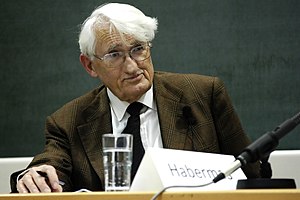
Back عقل تواصلي Arabic عقلانیت ارتباطی Persian Kommunikatiivinen rationalismi Finnish Rasionalitas komunikatif ID Ação comunicativa Portuguese
This article needs additional citations for verification. (March 2019) |

Communicative rationality or communicative reason (German: kommunikative Rationalität) is a theory or set of theories which describes human rationality as a necessary outcome of successful communication. This theory is in particular tied to the philosophy of German philosophers Karl-Otto Apel and Jürgen Habermas, and their program of universal pragmatics, along with its related theories such as those on discourse ethics and rational reconstruction. This view of reason is concerned with clarifying the norms and procedures by which agreement can be reached, and is therefore a view of reason as a form of public justification.
According to the theory of communicative rationality, the potential for certain kinds of reason is inherent in communication itself. Building from this, Habermas has tried to formalize that potential in explicit terms. According to Habermas, the phenomena that need to be accounted for by the theory are the "intuitively mastered rules for reaching an understanding and conducting argumentation", possessed by subjects who are capable of speech and action.[1] The goal is to transform this implicit "know-how" into explicit "know-that", i.e. knowledge, about how we conduct ourselves in the realm of "moral-practical" reasoning.
The result of the theory is a conception of reason that Habermas sees as doing justice to the most important trends in twentieth century philosophy, while escaping the relativism which characterizes postmodernism, and also providing necessary standards for critical evaluation.[2]
- ^ Habermas, Jürgen. Communication and the Evolution of society. Beacon Press, 1979, p. 18.
- ^ Habermas 1992